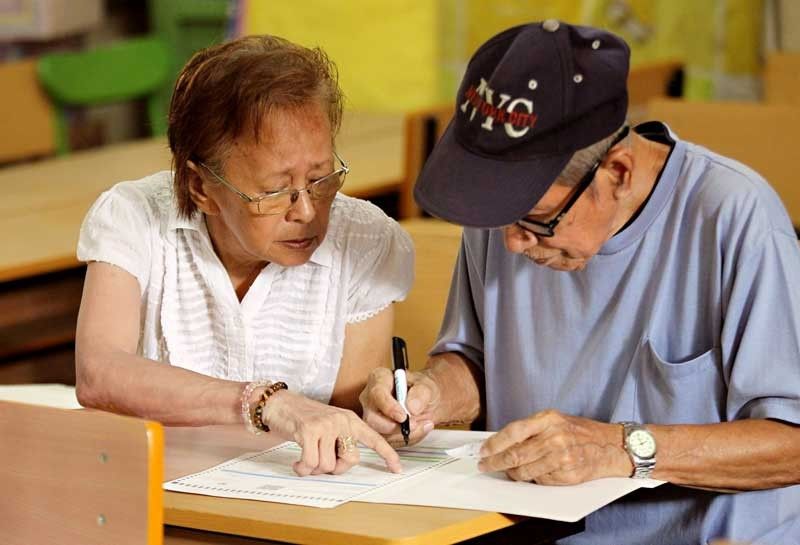‘Problematic but successful’

Comelec: 400 to 600 VCMs malfunctioned
MANILA, Philippines — There were some problems including malfunctioning vote-counting machines (VCMs), but the midterm elections yesterday were “generally successful,” according to the Commission on Elections (Comelec).
Around 400 to 600 VCMs were reported to have malfunctioned, mostly due to defective secure digital cards, creating long lines of voters who became impatient over the delay.
Comelec spokesman James Jimenez said the 400 to 600 were minimal, considering that more than 85,000 VCMs were used in the elections.
But Jimenez said the figures could go higher as they were still waiting for more reports from the field.
He said all clustered precincts “functioned,” although polling stations opened late in Isabela, Zambales, Naga City in Cebu, Samar, Compostela Valley and Sultan Kudarat.
“Because we see that a lot of precincts are open and we are getting a lot of reports that people are able to cast their votes successfully, we think it is generally successful. There are some problems that have cropped up that we are addressing as they are happening,” Jimenez said.
He gave assurance the Comelec was able to replace the problematic VCMs as there were 9,000 “contingency” units available at Comelec regional hubs.
He admitted the number of malfunctioning VCMs is higher now compared to the 125 units that bogged down during the 2016 elections, when these were first used by Comelec on a lease contract with Smartmatic.
For the midterm polls, the poll body purchased the machines from Smartmatic, which has been given a minimal role in the elections.
The Comelec cannot ascertain if previous use of the VCMs caused the malfunctioning.
Faulty SD cards
Jimenez said the “primary cause of delay” was likely the SD cards that were “not functioning.”
He gave assurance these cards were replaced.
“We are still pinning down the reasons for the issues that we experienced for the VCMs, but right now all we have is the SD cards… This will be investigated to find out the root of the problem,” he said.
Scanned or encrypted images of ballots accomplished by voters are stored in the SD cards.
Jimenez said other concerns they monitored included “precinct inquiries” like missing names on the voters’ lists.
“This election might be a little problematic because of all the issues that we encountered, but we are resolving those issues,” he said.
Poll watchdog National Citizens’ Movement for Free Elections (Namfrel) said the malfunctioning VCMs caused long lines of voters in several precincts in Mindanao and in Metro Manila.
It said incidents of VCM failure were particularly reported in the villages of Sta. Cruz, Ugong, Manggahan and Rosario, all in Pasig.
Similar scenario occurred in East Rembo in Makati City, Muntinlupa, Las Piñas, Mandaluyong and San Juan, it added.
Namfrel said there were reports that some VCMs in Pagadian and Dinagat Islands overheated.
Lito Averia, Namfrel national council member, said that aside from the problematic VCMs, cases of failure of voter registration verification machines (VRVMs) were reported in Davao, Lanao del Sur, Cagayan de Oro and Basilan.
“This developed long lines of voters and caused delay in the voting process, especially if the Board of Election Inspectors (BEI) did not have any backup plan,” Averia said.
He said this was the first time the Comelec used the VRVMs, which were pilot-tested in select areas of Manila, Quezon City, Cebu and Cavite.
Not alarming
Church-run poll watchdog Parish Pastoral Council for Responsible Voting (PPCRV) said the reported malfunctioning of 400 to 600 VCMs is not alarming.
PPCRV executive director Maribel Buenaobra said the figure “is less than one percent” or around 0.4 percent of the total 85,000 VCMs that were deployed.
Buenaobra said they don’t have validated reports of voters walking out due to frustration over defective VCMs.
She said they have asked their volunteers to assist the electorates in areas where the VCMs were reported to have malfunctioned.
“We are in coordination with the diocese and coordinators, they have been calling me up since this morning. I keep telling them to assist the voters, we are there to assist the voters, to make sure that voters are calm and that they are assisted by our volunteers,” said Buenaobra.
Dismayed voters
The Teachers’ Dignity Coalition said there were reports that voters left the polling places because of dismay after queuing for hours and not being able to vote.
The matter also affected the teachers as some voters blamed them for the glitches that happened.
The Alliance of Concerned Teachers (ACT) said most of the reports they received also involved malfunctioning VCMs and VRVMs.
The group said among the issues reported were VCMs that were unable to read ballots, not switching on, restarting repeatedly and ballots getting jammed.
The VRVMs had issues with the biometrics feature, prompting the teachers to forgo it and revert back to manual verification of voters on printed lists.
“We are receiving reports from the teacher-poll workers that voters are yelling at them due to the delay in voting. They are getting the blame for the malfunctioning machines,” ACT chair Joselyn Martinez said.
Among the areas of malfunctioning VCMs were Quezon City, with 18; Bataan with 33 and Bulacan, four.
Quezon City police director Gen. Joselito Esquivel said seven of the 18 VCMs had to be replaced as of noon.
Non-operational
The Philippine National Police (PNP) said six voting centers were non-operational due to defective VCMs and absence of teachers.
PNP chief Gen. Oscar Albayalde said these voting centers are located in Lanao del Norte.
Albayalde said the impact is minimal as it only comprised .02 percent of the 36,831 voting centers nationwide.
He said they were verifying reports that some teachers backed out in other parts of Mindanao, Calabarzon (Cavite, Laguna, Batangas, Rizal and Quezon) and Metro Manila.
“It’s good we have people trained as election boards on standby,” he said.
The PNP has trained 2,838 police officers to act as BEIs.
Aside from defective VCMs, minor problems were also noted in the elections such as the lack of marking pens and missing names of voters.
The Department of Education (DepEd) said it received over 1,600 reports of marking pens that were not replaced following the final testing and sealing prior to the elections.
More than 1,490 teachers said that election paraphernalia were not immediately distributed and 2,000 encountered problems with transportation for members of the electoral boards.
The reports were among those that were submitted through a mobile application rolled out for this year’s midterm polls. – With Janvic Mateo, Evelyn Macairan, Rhodina Villanueva, Emmanuel Tupas, Romina Cabrera, Eva Visperas, Ric Sapnu, Ramon Efren Lazaro
- Latest
- Trending



























